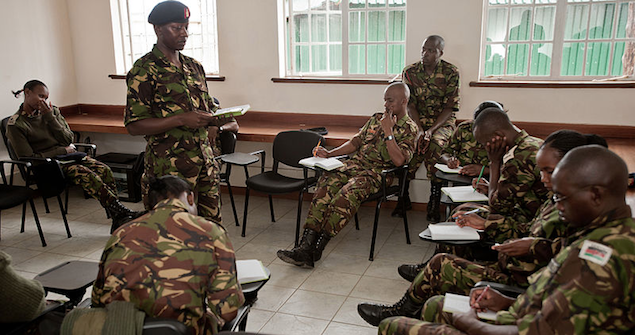Terrorism in Kenya

The attack on Garissa University College in early April marks a shift towards increasing extremism and more stringent government legislation.
On April 2, 147 students were murdered by al-Shabab gunmen targeting Christians at Garissa University College in north-eastern Kenya, near the border with Somalia.
This attack comes after a difficult year for Kenya, as Anthony Bergin and I outlined. One Melbourne-based Kenyan professional explains the effects of increased political violence:
It’s interesting, having grown up in a country which has always known peace. At one we called ourselves the “Island of Peace” in Africa. Somalia had civil war; Ethiopia had unrest; Uganda had Idi Amin. And now we’re being slaughtered.
Kenya now sits at Number 12 on the Global Terrorism Index, published by the Institute of Economics and Peace. This is above Egypt, Israel and Mali.
Kenya hasn’t had problems with home-grown terrorists in the past. Former president Daniel Moi set up the National Youth Service that did army training. They never did much with the army, as we’ve traditionally had peace. But they gained life skills and were kept busy, so they weren’t restless. These days a lot of youth have a lot of free time and it’s causing problems.
I think the political violence problem stems from an identity crisis. It’s hard to truly radicalise people in Kenya because the community divide is much smaller. We are in many ways a secular state with Christians, Muslims and Hindus living side by side. That sort of diversity feeds through the perspectives of the law. We do get along well, and that makes it harder to radicalise people.
This diversity has not protected the country from increasing radicalisation and violent extremism. The most notable example was perhaps the Westgate mall shooting in September 2013, the first major terrorist attack in Kenya since the U.S. Embassy bombing in 1998.
This was really well planned, and exposed the weaknesses of our corrupt society; the terrorists had actually bribed the security in the mall. They had brought all this ammunition in, despite the mall being really well guarded. This shooting made Kenyans realise how bribe-able we are.
The government’s response came to a head in December 2014, when fighting broke out in the Kenyan Parliament whilst debating a new anti-terrorism bill. Measures include the right to detain terror suspects for a year, the power for intelligence agencies to tap phones without court consent and the requirement for journalists to obtain police consent before publishing stories on domestic terrorism and security issues.
The passing of that law was unbelievable. The House broke so many rules in passing it. They didn’t debate the amendments, people were fighting, and a law passed through all that.
Long term, they’re terrible measures. They violate a lot of our obligations under international law, a lot of our freedoms we’ve worked hard as a nation to get. I think we’re heading for some serious unrest. The new slogan amongst Kenyans seems to be ‘accept and move on’. They’ll accept the new laws and just be disenfranchised. As long as people can do their business, they won’t care.
It’s important to note that increased anti-terror legislation is not unique to Kenya. Recently-proposed Canadian and Australian laws have been met with criticism. The Kenyan legislation has been criticised at home and abroad as being politically-motivated; eroding basic freedoms and targeting civil society and the media instead of terrorist groups.
Whilst the Kenyan High Court last month announced they would reject measures such as restrictions on media freedom and capping the number of refugees following a legal challenge from the opposition, the government stated they would consider an appeal. It’s a credit to Kenyan democracy that such measures were vehemently rejected, even in a time of heightened threat. But there’s also a concern that a genuinely frightened population won’t always have the strength to reject measures they disagree with.
In some ways, terrorism has worn us down to the point that I think the feeling on the ground is, do whatever it takes. People have been so terrorised that almost any move will do now. Things like going to the supermarket are an issue. You can’t do anything without a legitimate threat.
I don’t think Kenyans truly think this is the answer. I think they realise that terrorism has been politicised. But that’s what fear does to you. You’ll take any solution. We’ve had enough, and that’s why these laws have passed. People have forgotten what it was like living in former regimes, and all they can recall is living in fear as they are now.
Increased foreign investment has bolstered the Kenyan economy. The World Bank’s 2015 Doing Business report praised Kenya’s efforts in regulatory improvements. However, warnings against travelling to Kenya issued by the UK, US and Australia and the closing of diplomatic missions have severely affected tourism.
Terrorism has crippled our tourism industry. I used to tell friends all the time to come to Kenya; I’ve stopped saying that now. I don’t want people to take risks. I can’t guarantee safety now because the attacks are so random.
Systemic corruption remains a barrier to maintaining stability.
It’s all well and good to say, provide us with better security, But I don’t know if the government knows how to. They can’t see that letting a car being allowed to drive into an area will lead to 60 people being killed tomorrow. When you live, breath, sleep corruption, you can’t see the consequences of your actions.
Clare Murphy is a Researcher at the Australian Strategic Policy Institute’s Strategic Policing & Law Enforcement Program. This article can be republished with attribution under a Creative Commons Licence.





